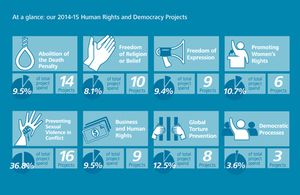UK Statement at OSCE Permanent Council on Human Rights and Democracy
Head of the UK Delegation to the OSCE, Ambassador Schroeder, announces launch of the FCO annual Human Rights and Democracy Report for 2014.

FCO Human Righs & Democracy Report graphic
Organisation for Security and Co-operation in Europe, Vienna, Austria
12 March 2015
Mr. Chairman,
I fully support the statement made by Latvia on behalf of the EU and would like to make a few remarks in my national capacity.
Director Link’s report to the Permanent Council today coincides with the launch in London of the Foreign and Commonwealth Office’s Human Rights and Democracy Report for 2014. I therefore thought it appropriate to say something about the report whilst we have the Head of the OSCE’s principal human rights institution in the room. I should say by the way that the UK government was delighted that Director Link was recently able to visit London for an exchange of views with UK ministers and parliamentarians on the OSCE’s human dimension work.
The Human Rights and Democracy Report provides a UK perspective on the global human rights situation during 2014. Its purpose is to raise awareness of the UK’s role in promoting human rights worldwide, as well as to influence countries to take more concrete steps to meet their international human rights obligations. We have circulated details on how to access the full report to all delegations. It is a long read demonstrating the scale of the human rights challenges that we all face. But there are a couple of points from the report that I consider to be of particular relevance to our work.
The report reiterates the British government’s strong support for the OSCE’s institutions. It praises ODIHR for its impartial and professional observation of two of its largest election observation missions in Ukraine last year. It notes that these were achieved in a challenging security environment and highlights ODIHR’s deserved reputation as an international standard setter in the field of election observation. It recalls last year’s Human Rights Assessment Mission to Ukraine conducted jointly by ODIHR and the HCNM notes and notes that the independent, impartial and non-political analysis was helpful in countering Russian propaganda and misinformation. The report also has a major focus on the important role of civil society in promoting and protecting human rights. It notes that one of the most striking trends of 2014 was the pressure put by governments on civil society organisations in many parts of the world.
The report contains a case study on the shrinking space for civil society in Eastern Europe and Central Asia and sets out many of the concerns that have arisen in discussions here at the Permanent Council.
And the report also contains a case-study on human rights violations in Crimea and the separatist occupied areas of Ukraine. The report calls for greater access to Crimea for international human rights monitoring organisations such as the OSCE.
Mr Chairman,
The promotion and protection of human rights is important not only because it is the right thing to do, but also because it is in our national interests to do so. Countries that respect the human rights of their citizens are invariably more stable, prosperous and innovative. They generally make better neighbours.
An international rules based system provides an essential framework to underpin our human rights work. ODIHR with its extensive mandate and considerable expertise has an important role to play in supporting those efforts and I pay tribute to ODIHR’s professionalism and dedication.
Thank you Mr. Chairman.